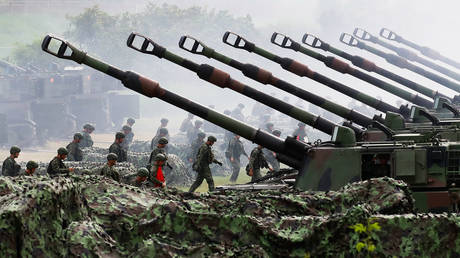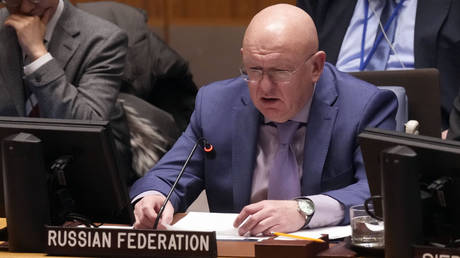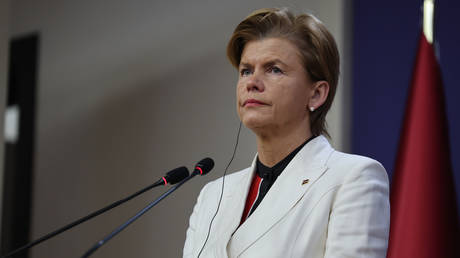Donald Trump and Vladimir Putin after the Helsinki summit in 2018. Trump has long been accused of being too close to Putin.
Mikhail Svetlov/Getty Images
The relationship between Trump and Putin has long been a source of controversy.Analysts say Trump could broker a Ukraine peace deal on terms favorable to Russia.That could have severe consequences for both the US and global economy, experts say.
With only a month to go before the presidential election, Donald Trump’s relationship with Russian President Vladimir Putin has once again come under the spotlight.
In a forthcoming book, journalist Bob Woodward says that the former president and Putin have a closer friendship than previously known.
According to excerpts published by CNN and the Washington Post on Tuesday, Trump sent Putin COVID testing devices in early 2020 for his personal use.
The book also says that Trump may have had up to seven phone calls with Putin since leaving office in 2021, citing a Trump aide.
The Trump campaign denied the report, with spokesman Steve Cheung claiming it is “the work of a truly demented and deranged man who suffers from a debilitating case of Trump Derangement Syndrome.”
The Kremlin on Tuesday said that Russia received the COVID-19 testing kits, though added that Russia sent kits to the US in return. It denied the seven calls that Woodward said Trump had with Putin.
While speculation and criticism about Trump’s relationship with Russia’s autocratic leader are nothing new, they are taking on a new significance amid the possibility of a second Trump presidency.
The Trump-Putin relationship
Only weeks before Trump took office after his presidential victory, his administration-in-waiting was rocked by the publication of a dossier prepared by a former British spy.
The report said that the Kremlin had secured compromising information that it could use to blackmail Trump.
Trump’s legal team said the dossier contained inaccurate information and that it breached his data protection rights.
A subsequent inquiry by Special Counsel Robert Mueller found no evidence of coordination between Putin and the Trump campaign.
An inquiry by Special Counsel Robert Mueller found no evidence of coordination between Putin and the Trump campaign.
REUTERS/Yuri Gripas
Throughout his presidency, however, Trump appeared friendly toward Putin and was reluctant to criticize Russia over reports of interference in the 2016 US presidential election.
Trump has continued to praise Putin for being “smart” and “genius” after he began his unprovoked invasion of Ukraine.
“I’d say that’s pretty smart. He’s taking over a country – really a vast, vast location, a great piece of land with a lot of people, and just walking right in,” Trump said in 2022.
A Ukraine deal
The US, under President Joe Biden, has provided billions in aid to Ukraine to battle the invasion launched by Russia in 2022, which the president has characterized as a fight between the forces of democracy and tyranny.
Yet Trump has questioned why the US is helping Ukraine defend itself and had urged Republicans in Congress to block a Ukraine aid bill earlier this year, resulting in Ukraine suffering ammunition shortages.
He has claimed that he’d be able to swiftly negotiate a peace deal between Ukraine and Russia if he became president.
And though he’s offered few details on how, a peace plan suggested by his running mate, JD Vance, on a podcast in September indicates that it’d involve Ukraine ceding the territory Russia holds and pledging neutrality.
Trump could hypothetically compel Ukraine’s President Volodymyr Zelenskyy to agree to the deal or face US aid being cut off.
Critics say it’s a deal that would likely delight the Kremlin and infuriate US allies in Europe and beyond. It could also come back to haunt the US.
There could be catastrophic consequences
Philip Ingram, a former UK military intelligence officer, told Business Insider that a Trump deal with Putin that involved ceding Ukrainian territory could have catastrophic effects.
“I think if Trump forces Zelenskyy into a peace deal where he has to give up any territory, then that will stimulate the start of World War Three, and it will happen within a relatively short period of time,” he said.
“And the economic impact that that will have across the globe will be enormous.”
The Ukraine war has already roiled markets for food, oil, gas, and other products, and wider conflict could have an even more devastating impact.
Economist Kenneth Rogoff in an article for The International Monetary Fund warned that the war is worsening “rising inflation, extreme poverty, increasing food insecurity, deglobalization, and worsening environmental degradation.”
William Pomerantz, an analyst at the Wilson Center in Washington, DC, told BI a deal would hugely damage US alliances.
“Trump believes that he can end the war in Ukraine in a week, but that would require conceding to all of Putin’s demands,” he said.
“That would essentially end our alliance with Europe and our international credibility.”
Empowering China
Some Republicans, including Vance, say the US needs to shift its stance away from helping Ukraine battle Russian aggression toward the more urgent threat they say China poses.
Yet analysts told BI in July that China’s threat is closely linked to Russia’s, with Putin and fellow Chinese autocrat Xi Jinping having formed a pact to weaken US global dominance.
A Russian victory in Ukraine would likely embolden Xi to launch an invasion of US ally Taiwan, said Ingram.
If Russian President Vladimir Putin is victorious in Ukraine, it may embolden Chinese leader Xi Jinping to invade Taiwan.
Sergei Savostyanov/Pool/AFP/Getty Images
If Xi believes that the West has “given in” regarding Russia’s invasion of Ukraine despite the money and diplomatic effort spent trying to defeat Russia, “we would very quickly see his invasion of Taiwan,” he said.
European leaders have also issued stark warnings that Russia, emboldened by its territorial victory in Ukraine, could seek to attack a NATO state in as little as five years.
Spiralling conflicts in Asia, Europe, and the Middle East would have a devastating economic impact.
JPMorgan CEO Jamie Dimon warned last month that investors are overlooking geopolitcal tensions as key risk that could significantly weaken the global economy.
“Geopolitics is getting worse, they are not getting better. There is chance for accidents in energy supply. God knows if other countries get involved. You have a lot of war taking place right now,” Dimon told CNBC-TV18 during a visit to India.
Dimon said that if geopolitical tensions elevate to instability and conflict, it will drag down the stock market in a way that pales in comparison to prior market crashes.
Trump’s words and actions differ
Ingram pointed out that there has in the past been a gap between Trump’s words and actions, and questioned whether Trump would be willing to risk the economic blowback on the US of canceling Ukraine aid, with arms manufacturing firms in swing states such as Pennsylvania massively boosted by the Congressional aid bills.
“What we’re hearing from him, from a political perspective, but what he’d actually practically do will be different,” said Ingram.
It is also unclear Trump would continue to impose sanctions on Russia if he becomes president.
“It’s much harder to predict him on that stuff,” William Reinsch, a senior advisor at the Center for Strategic and International Studies, told The Wall Street Journal in August. “I would say [he is] sort of inconstant. He tends to veer from one thing to another.'”
Either way, Trump will have to deal with economic problems at home, including record debt levels and surging interest payments.
Trump’s economic plans are estimated to raise the federal debt level by double the figure expected if Kamala Harris is elected, according to a report out this week.
Harris would add $3.5 trillion to the projected fiscal debt through 2035, while Trump would add $7.5 trillion, the Committee for a Responsible Federal Budget analysis said.
“Our large and growing national debt threatens to slow economic growth, boost interest rates and payments, weaken national security, constrain policy choices, and increase the risk of an eventual fiscal crisis,” it added.
If elected for a second term, Trump has pledged to purge the US government of those he deems disloyal to his agenda if reelected and could surround himself with loyalists rather than career officials seeking to check his more impulsive decisions.
Pomeranz said that Trump’s policies in a second term would more openly reflect his admiration for Russia’s leader, regardless of the US’ economic plight.
“Putin is the autocratic leader that Trump most admires,” he said. “Trump will present any end of hostilities [in Ukraine] as a personal victory, and Putin will validate this.”





+ There are no comments
Add yours